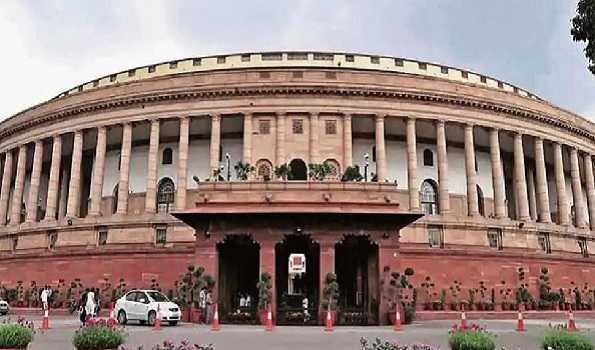
New Delhi, August 10 (UNI): The proceedings of the Lok Sabha was adjourned for the day on Tuesday after passing two Bills, the National Commission for Homoeopathy (Amendment) Bill, 2021 and the National Commission for Indian System of Medicine (Amendment) Bill, 2021, by voice vote amid ruckus by the Opposition over various issues, including Pegasus snooping row and new farm laws.
Soon after the Lok Sabha unanimously passed The Constitution (One Hundred and Twenty-Seventh Amendment) Bill, 2021, the Opposition Members, carrying placards, trooped into the Well of the House and started sloganeering over the issues.
Both the bills, the National Commission for Homoeopathy (Amendment) Bill, 2021 and the National Commission for Indian System of Medicine (Amendment) Bill, 2021 were passed by voice vote and without discussion amid the pandemonium.
After the passage of the two Bills, Rajendra Agarwal, who was in the chair, adjourned the House for the day.
The Lok Sabha unanimously passed a bill to restore power of state governments to have their own OBC lists, with the entire Opposition supporting the legislation.
The Constitution (One Hundred Twenty Seventh) Amendment Bill was passed with 385 members voting in support and none opposing it.
Several MPs demanded lifting the 50% limit for reservations, and also demanded a caste-based census.
The Constitution (One Hundred Second) Amendment Bill, which was passed in August 2018, gave constitutional status to the National Commission of Backward Classes. However, it also took away the authority of state governments.
On May 5, the Supreme Court in a judgment said only Centre has the right to update the OBC list. The Bill was then brought to nullify the effect of the order and restores the powers of the states to identify Backward Class groups.
Social Justice and Empowerment Minister Virendra Kumar took note of the demand and said careful examination of the demand for increasing the cap of reservation beyond 50 percent was needed as constitutional issues are involved.
He said courts have repeatedly emphasised that the reservation cap should be retained at 50%. “Therefore, it is necessary to carefully examine all constitutional and legal aspects in this regard,” the minister said.
Replying to the debate on the Bill, he said that several members have expressed their views on raising the reservation cap, which was fixed 30 years ago.
The Bill restores powers of State governments to have their own list of Backward Classes.
Amid ongoing stalemate in Parliament, Opposition had agreed to support the Bill which they said is important for the Backward Classes.




